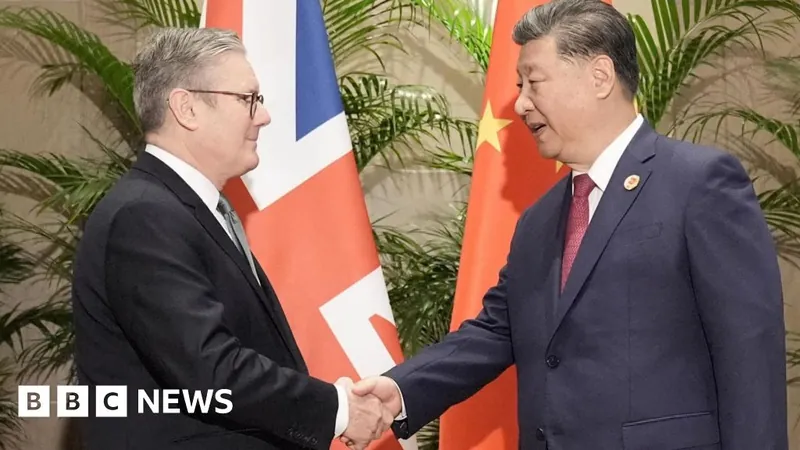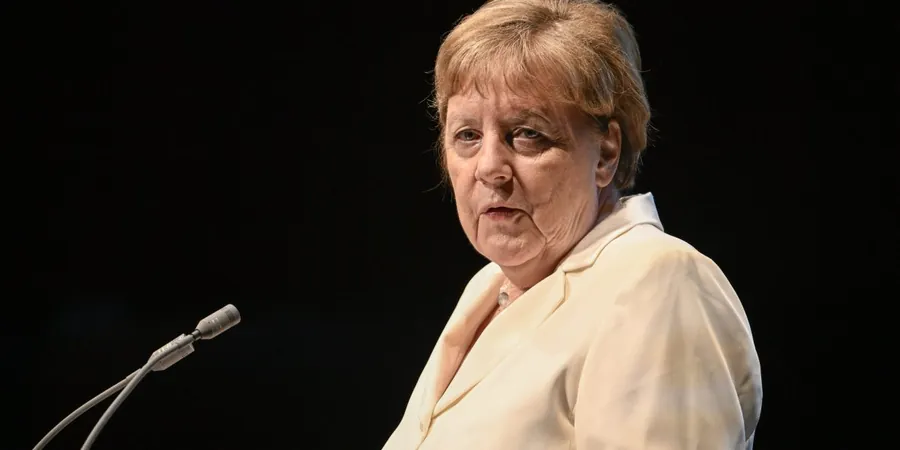
Keir Starmer Advocates for a Stronger UK-China Relationship Amid G20 Talks
2024-11-18
Author: Jia
Introduction
In a pivotal move for international diplomacy, Sir Keir Starmer, the UK Prime Minister, met with Chinese President Xi Jinping during the G20 summit in Rio de Janeiro, Brazil. This face-to-face encounter marked the first direct meeting between a UK leader and the Chinese president since 2018, a moment signaling potential thawing in the previously strained UK-China relations.
Key Discussion Points
During their discussions, Sir Keir emphasized the necessity of a 'strong UK-China relationship,' underlining its importance for both nations. In a notable moment, he raised concerns about the health of Jimmy Lai, a pro-democracy activist currently detained in Hong Kong, calling attention to reports suggesting a deterioration in his condition. This gesture not only reflects the UK's firm stance on human rights issues but also showcases Starmer's strategic approach to maintaining dialogue with China.
Business Cooperation and Human Rights
The Prime Minister's agenda extended beyond humanitarian concerns, advocating for enhanced business cooperation with China. He identified key areas of potential partnership, including climate change and economic growth, which both countries have described as mutually beneficial fields for collaboration. Starmer remarked, 'We want our relations to be consistent, durable, respectful... The UK will be a predictable, consistent, sovereign actor committed to the rule of law.'
China's Response
Xi Jinping reciprocated by expressing China's willingness to forge deeper connections across various sectors such as trade, clean energy, healthcare, and investment. A readout of their closed-door meeting highlighted the importance of global stability and the shared responsibility the leaders have in navigating the complexities of international cooperation, particularly as both nations aim to transition to renewable energy sources.
Challenges Ahead
However, the meeting was not without its challenges. Starmer made it clear that the UK’s engagement with China would always prioritize its national interests, particularly in light of rising tensions regarding human rights issues and China's perceived military support for Russia amidst the ongoing war in Ukraine. 'We wish to engage honestly and frankly on areas of disagreement,' he noted, pointing to Hong Kong's political climate and the ongoing conflict in Ukraine as pivotal topics for discussion.
Proposals for Future Engagement
Following their initial phone conversation in August — which took place after the Labour party's election victory — Starmer proposed a full-fledged bilateral meeting in either Beijing or London. Notably, it was also agreed that Chancellor Rachel Reeves would visit Beijing next year to further explore economic and financial cooperation with Vice Premier He Lifeng.
Critics and Concerns
Critics, including Priti Patel, the shadow foreign secretary from the Conservative party, have raised concerns that the Prime Minister must take a firmer stance on human rights issues, specifically regarding the national security laws enforced in Hong Kong and the fate of British national Jimmy Lai. Patel emphasized the need for more robust assurances from President Xi concerning the UK's areas of concern.
Geopolitical Context
Further complicating the UK-China relationship is the backdrop of increasing geopolitical pressures from the United States. Observers, including Dr. Yu Jie from Chatham House, suggest that while the tone of discussions is positive, significant technological and diplomatic tensions linger, particularly with the anticipated return of hawkish US policies under President-elect Trump.
Conclusion
As the summit unfolds, Sir Keir reiterated the UK's commitment to supporting Ukraine, advocating for stronger G20 cooperation in response to Russia’s aggressive military tactics. He insisted that failing to bolster support for Ukraine could lead to dire consequences for global security. This context serves as an essential backdrop, informing both the difficulties and opportunities present in the UK's diplomatic relationship with China.
In conclusion, the Starmer-Xi meeting signals a cautious but significant step toward rekindling UK-China relations, amid a broader international landscape marked by conflict and mutual dependency. As these discussions continue, many will be watching closely to see if tangible agreements can emerge from this diplomatic thaw.


 Brasil (PT)
Brasil (PT)
 Canada (EN)
Canada (EN)
 Chile (ES)
Chile (ES)
 España (ES)
España (ES)
 France (FR)
France (FR)
 Hong Kong (EN)
Hong Kong (EN)
 Italia (IT)
Italia (IT)
 日本 (JA)
日本 (JA)
 Magyarország (HU)
Magyarország (HU)
 Norge (NO)
Norge (NO)
 Polska (PL)
Polska (PL)
 Schweiz (DE)
Schweiz (DE)
 Singapore (EN)
Singapore (EN)
 Sverige (SV)
Sverige (SV)
 Suomi (FI)
Suomi (FI)
 Türkiye (TR)
Türkiye (TR)